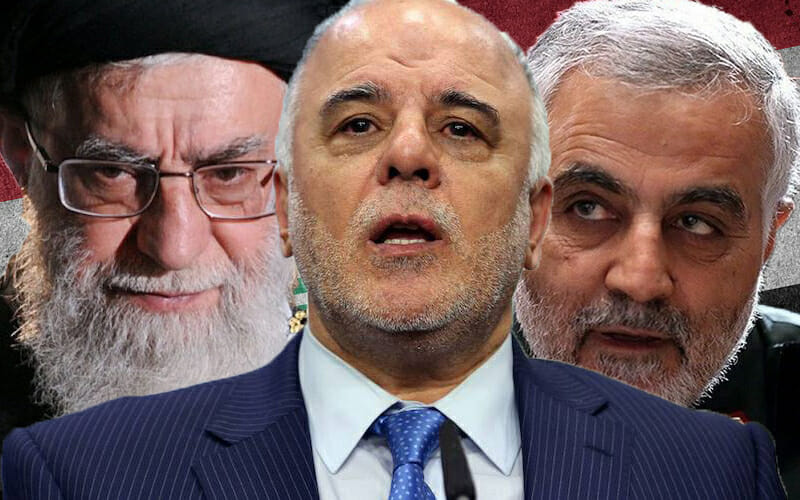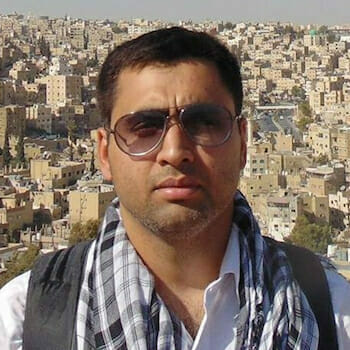
Iraq is a Client State of Iran
The recent takeover of Kirkuk by the Iranian backed militias and the Iraqi army clearly illustrates that Iran is controlling every important decision in Iraq. The whole operation and withdrawal of Peshmerga forces without resistance to advancing Iraqi forces was planned by Iran Quds force commander Major General Qasem Soleimani.
What role the Iraq Prime Minister’s office had in this whole episode is still unclear but one thing is certain: decisions were made in Tehran and Baghdad only followed them. Geopolitical observers are now criticizing Iraqi Prime Minister Haider al-Abadi for being too quick to resort to force against the Kurds at the behest of Iran rather than engaging in talks with Erbil which helped Baghdad in the fight against ISIS.
There are number of ways in which Iran gains from this current crisis. Not only does the conflict undermine Kurdish unity, it also boosts the role of Iranian backed militias operating in Iraq and makes them look like guardians of national unity rather than sectarianism.
The fall of Kirkuk clearly shows the extent to which Iraq today is an Iranian controlled territory. And it demonstrates the currently unparalleled efficacy of the Iranian methods of revolutionary and political warfare, as used by Iran Revolutionary Guards Corps (IRGC) throughout the Arab world to promote Iran’s geopolitical interests. Iran’s influence in Iraq is not just ascendant, but extends to almost all areas.
During Saddam Hussein’s rule, Iran granted asylum to a number of Iraqi opposition parties and part of its ability to greatly affect Iraqi political theatre today is linked to the fact that the individuals comprising a significant portion of the Iraqi political map formerly resided in Iran. Politically, Iran has a large number of allies in Iraq’s Parliament who can help secure its goals. Even the most senior Iraqi cabinet officials take instructions from Iran’s leadership.
Tehran has been the principal backer of mainly Popular Mobilization Forces (PMF) formed to fight the Islamic State and is now formally absorbed into the Iraqi military. Iranian Revolutionary Guards Corps (IRCG) overseas arm, the Quds Force, provides the bulk of logistical support and advice to Popular Mobilisation Forces. In turn, Iran uses PMF to exert military leverage over the Iraqi government much like Hezbollah did in Lebanon.
Trade between these two nations is primarily one directional favoring Iran and years of sanctions and the internal conflicts have rendered Iraq dependent on Iranian imports. The only place outside Iran where the Iranian currency is used as a medium of exchange is southern Iraq. Iran is dumping cheap, subsidized food products and consumer goods into Iraqi markets and is undercutting its neighbor’s agricultural and manufacturing sectors. Iran’s damming and diversion of the rivers feeding the Shatt al-Arab waterway has greatly undermined the Iraqi agriculture sector in the south and hindered efforts to revive Iraq’s marshlands. Iran has withheld water flows of the Kalal River, which flow into Wasit province, and of the Karun and Karkha rivers, which flow into Basra province.
Moreover, Iran is also pursuing a long-term strategy to expand its religious authority in Iraq in many ways by using financial and political leverage to ensure the primacy of clerics trained in the Iranian seminary of Qom and loyal to the Iranian ideology, over clerics trained in the relatively non-political tradition of the Najaf seminary. Iran is reconstructing the shrines in Iraq and consequently, taking control of their long term management. Iran has also taken control of the pilgrimage observances in Iraq’s shrine cities, notably the Arbaeen procession which attracts millions of devotees every year in Karbala.
Despite this great degree of Iranian influence on the Iraqi nation there is a ray of hope. Prime Minister Haider al-Abadi has the potential to be pulled away from Iran’s influence and act as an independent figure. He has stood up against Iran’s pressures on some occasions. But still al-Abadi government officials must prove their allegiance to the Iraqi people and not to the Iranian regime. The Iraqi judiciary is also heavily under Tehran’s influence, as noted when the country’s Supreme Court last October blocked al-Abadi’s reform package. Efforts have been made to cleanse the judiciary and make it independent. Current Iraqi leadership should also try to bridge the gulf with its Sunni and Kurdish minorities by establishing an equal method of governance across the country. Not all Iraqi Shia are pro-Iranian, in fact, many are fervently nationalistic. Prime Minister Abadi can tap into Iraqi nationalism to combat further sectarian division.
